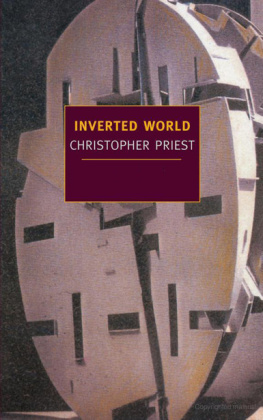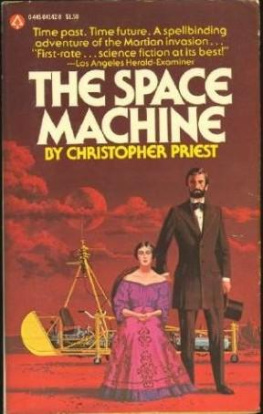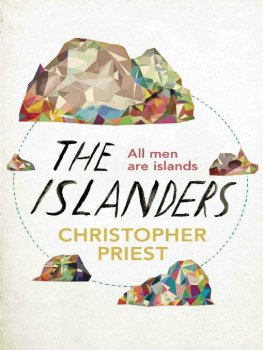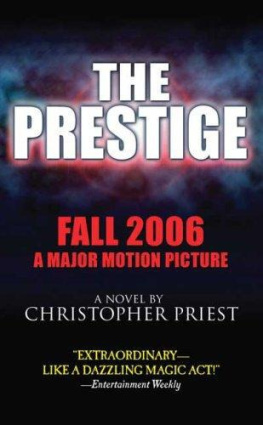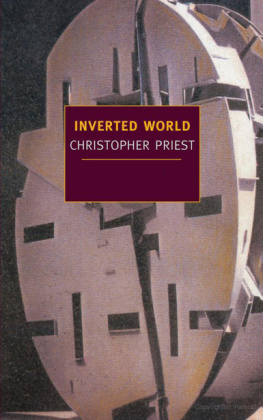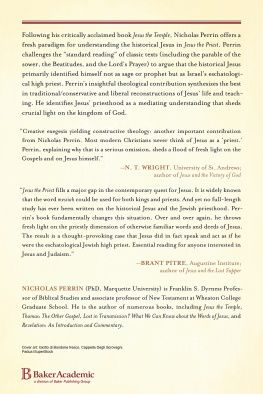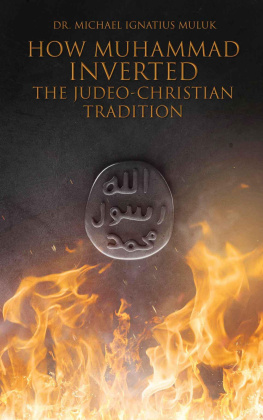Christopher Priest - The Inverted World
Here you can read online Christopher Priest - The Inverted World full text of the book (entire story) in english for free. Download pdf and epub, get meaning, cover and reviews about this ebook. year: 1974, publisher: Harper & Row, genre: Detective and thriller. Description of the work, (preface) as well as reviews are available. Best literature library LitArk.com created for fans of good reading and offers a wide selection of genres:
Romance novel
Science fiction
Adventure
Detective
Science
History
Home and family
Prose
Art
Politics
Computer
Non-fiction
Religion
Business
Children
Humor
Choose a favorite category and find really read worthwhile books. Enjoy immersion in the world of imagination, feel the emotions of the characters or learn something new for yourself, make an fascinating discovery.
- Book:The Inverted World
- Author:
- Publisher:Harper & Row
- Genre:
- Year:1974
- Rating:5 / 5
- Favourites:Add to favourites
- Your mark:
- 100
- 1
- 2
- 3
- 4
- 5
The Inverted World: summary, description and annotation
We offer to read an annotation, description, summary or preface (depends on what the author of the book "The Inverted World" wrote himself). If you haven't found the necessary information about the book — write in the comments, we will try to find it.
The Inverted World — read online for free the complete book (whole text) full work
Below is the text of the book, divided by pages. System saving the place of the last page read, allows you to conveniently read the book "The Inverted World" online for free, without having to search again every time where you left off. Put a bookmark, and you can go to the page where you finished reading at any time.
Font size:
Interval:
Bookmark:
THE INVERTED WORLD
by Christopher Priest
Copyright 1974 by Christopher Priest. All rights reserved. Printed in the United States of America. No part of this book may be used or reproduced in any manner whatsoever without written permission except in the case of brief quotations embodied in critical articles and reviews. For information address Harper & Row, Publishers, Inc., 10 East 53rd Street, New York, N.Y. 10022.
FIRST U.S. EDITION
To my mother and father
Wheresoeer I turn my view,
All is strange, yet nothing new;
Endless labour all along,
Endless labour to be wrong.
SAMUEL JOHNSON
Elizabeth Khan closed the door of the surgery, and locked it. She walked slowly up the village street to where the people were gathering in the square outside the church. There had been a mood of expectancy all day as the huge bonfire took shape, and now the village children ran excitedly in the street, waiting for the moment when the fire would be lit.
Elizabeth went first to the church, but there was no sign of Father dos Santos.
A few minutes after sunset one of the men put a light to the dry tinder at the base of the pile of wood, and bright flame crackled through and up. The children danced and jumped, crying to each other as the timber popped and spat sparks.
Men and women sat or lay on the ground near the fire, passing flagons of the dark, rich local wine. Two men sat apart from the others, each lightly fingering a guitar. The music was soft, played for its own sake, not for dancing.
Elizabeth sat near the musicians, drinking some of the wine whenever a flagon was passed to her.
Later, the music became louder and more rhythmic, and several of the women sang. It was an old song, and the words were in a dialect Elizabeth could not follow. A few of the men climbed to their feet and danced, shuffling with arms linked, very drunk.
Responding to the hands that reached out to pull her up, Elizabeth went forward and danced with some of the women. They were laughing, trying to show her the steps. Their feet threw up clouds of dust that drifted slowly through the air before being caught and swept up in the vortex of heat above the fire.
Elizabeth drank more wine, danced with the others.
When she stopped for a rest she realized that dos Santos had appeared.
He was standing some distance away, watching the festivities. She waved to him, but he made no response. She wondered if he disapproved, or whether he was simply too reserved to join in. He was a shy, gauche young man, ill at ease with the villagers and as yet unsure of how they regarded him. Like Elizabeth he was a newcomer and an outsider, although Elizabeth believed that she would overcome the villagers suspicions faster than he would. One of the village girls, seeing Elizabeth standing to one side, took her hand and dragged her back to the dance.
The fire burned down, the music slowed. The yellow glow thrown by the flames dwindled to a circle about the fire itself, and the people sat on the ground once more, happy and relaxed and tired.
Elizabeth refused the next flagon that was passed to her, and instead stood up. She was rather more drunk than she had realized, and she staggered a little. As some of the people called out to her she walked away, leaving the centre of the village, and went out into the dark countryside beyond. The night air was still.
She walked slowly and breathed deeply, trying to clear her head. There was a way she had walked in the past, across the low hills that surrounded the village, and she went that way now, lurching slightly on the irregularities of the ground. At one time this had probably been rough pastureland, but now there was no agriculture to speak of in the village. It was wild, beautiful country, yellow and white and brown in the sunlight; now black and cool, the stars brilliant overhead.
After half an hour she felt better, and headed back towards the village.
Walking down through a grove of trees just behind the houses, she heard the sound of voices. She stood still, listening but she heard only the tones, not the words.
Two men were conversing, but they were not alone. Sometimes she heard the voices of others, perhaps agreeing or commenting. None of it was her concern, but nevertheless her curiosity was piqued. The words sounded urgent, and there was a sense of argument to the conversation. She hesitated a few seconds more, then moved on.
The fire had burned itself out: now only embers glowed in the village square.
She walked on down to her surgery. As she opened the door she heard a movement, and saw a man near the house opposite.
Luiz? she said, recognizing him.
Goodnight, Menina Khan.
He raised his hand to her, and went inside the house. He was carrying what appeared to be a large bag or a satchel.
Elizabeth frowned. Luiz had not been at the festivities in the square; she was sure now that it had been him she had heard in the trees. She waited in the doorway of the surgery a moment longer, then went inside. As she closed the door she heard in the distance, clear in the still night, the sound of horses galloping away.
I was given a key to the crche, told that I might continue to use my cabin until accommodation could be found in guild quarters, and reminded once more of my oath. I went straight to sleep.
I was awakened early by one of the guildsmen I had met the previous day.
His name was Future Denton. He waited while I dressed myself in my new apprentices uniform, and then led me out of the crche. We did not take the same route as that along which Bruch had led me the day before, but climbed a series of stairs. The city was quiet. Passing a clock I saw that the time was still very early indeed, just after three-thirty in the morning. The corridors were empty of people, and most of the ceiling lights were dimmed.
We came eventually to a spiral staircase, at the top of which was a heavy steel door. Future Denton took a flashlight from his pocket, and switched it on. There were two locks to the door, and as he opened it he indicated that I should step through before him.
I emerged into coldness and darkness, such extremes of both that they came as a physical shock. Denton closed the door behind him, and locked it again. As he shone his flashlight around I saw that we were standing on a small platform, enclosed by a handrail about three feet high. We walked over and stood at the rail. Denton switched off his light, and the darkness was complete.
Where are we? I said.
Dont talk. Wait and keep watching.
I could see absolutely nothing. My eyes, still adjusted to the comparative brightness of the corridors, tricked my senses into detecting coloured shapes moving about me, but in a moment these stilled. The darkness was not the major preoccupation; already the movement of the cold air across my body had chilled me and I was trembling. I could feel the steel of the rail in my hands like a spear of ice, and I moved my hands trying to minimize the discomfort. It was not possible to let go though. In that absolute dark the rail was my only hold on the familiar. I had never before been so isolated from what I knew, never before been confronted with such an impact of things unknown. My whole body was tense, as if bracing itself against some sudden detonation or physical shock, but none came. All about me was cold and dark and overwhelmingly silent bar the sound of the wind in my ears.
As the minutes passed, and my eyes became better able to adjust, I discovered I could make out vague shapes about me. I could see Future Denton beside me, a tall black figure in his cloak, outlined against the lesser darkness of what was above him. Beneath the platform on which we stood I could detect a huge, irregularly shaped structure, black and black on black.
Font size:
Interval:
Bookmark:
Similar books «The Inverted World»
Look at similar books to The Inverted World. We have selected literature similar in name and meaning in the hope of providing readers with more options to find new, interesting, not yet read works.
Discussion, reviews of the book The Inverted World and just readers' own opinions. Leave your comments, write what you think about the work, its meaning or the main characters. Specify what exactly you liked and what you didn't like, and why you think so.

